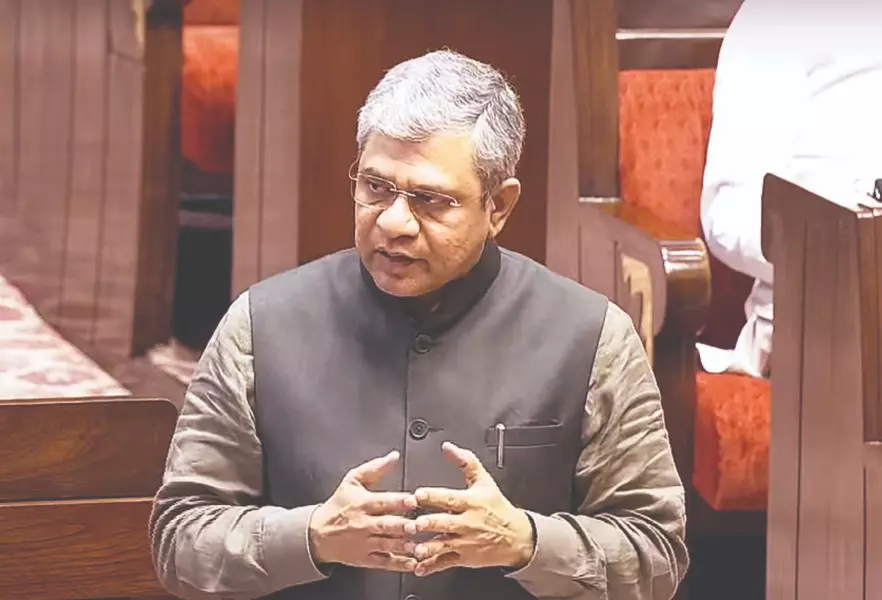Oppn parties raise questions over Starlink’s deal

NEW DELHI: Opposition parties have questioned the now-deleted post on ‘X’ by Minister of Information and Technology Ashwini Vaishnaw, welcoming Starlink to India.
Vaishnaw took to Elon Musk-owned microblogging platform X to welcome his satellite internet service to India after Airtel and Jio announced that they were signing deals for the same. The minister, however, deleted the post, leaving social media users and Opposition leaders questioning, “Why did IT minister delete his tweet?”
“Starlink, welcome to India!” wrote the minister, who also holds the Railways portfolio, on X. He added, “It will be useful for railway projects in remote areas.” While the tweet has been deleted, its screenshots are widely circulating on social media.
Leaders from Congress, Trinamool Congress and other Opposition parties shared a screenshot of the now-deleted post to question if it meant that the Indian government’s approval, which is still pending, is guaranteed.
Trinamool MP Saket Gokhle questioned if Elon Musk has paid the BJP to get the approval.
He wrote, “Elon Musk’s Starlink has not yet gotten govt approval. It also has not been allotted any satellite spectrum. But the tweet by @AshwiniVaishnaw CLEARLY shows that spineless PM Modi is going to bend over backwards for Trump & Elon Musk. The “govt approval” is clearly guaranteed. Question: How much is the BJP getting from Elon Musk? What is Modi getting in return for meekly selling out our country to the US establishment? Help with elections?”
Congress leader Jairam Ramesh also raised doubts and highlighted that Airtel and Jio’s announcements—both within 12 hours—indicate that these partnerships have been “orchestrated by PM Modi to buy goodwill with Trump through Starlink’s owner Elon Musk”.
“But many questions remain. Perhaps the most important one relates to national security. Who will have the power to switch connectivity on or off when national security demands it? Will it be Starlink or its Indian partners? Will other satellite-based connectivity providers also be permitted and on what basis?,” he wrote on X.
Over the past few months, rivals Jio and Airtel had come together to demand an auction for awarding spectrum for satellite services in India, as they feared an administrative allocation would give Musk airwaves at a price lower than what they had paid via auctions in the past.
Jio will offer Starlink equipment in retail outlets and online stores and also support customer installation and activation on devices. Jio and SpaceX will also explore how they can boost each other’s offerings.
Starlink is the world’s largest low-earth-orbit (LEO) constellation operated by SpaceX.
The Communist Party of India (Marxist) also strongly opposed the agreements. The party has raised serious concerns regarding spectrum allocation and potential threats to national security, urging the government to stop the deal.
In a statement issued by the Polit Bureau, the CPI(M) highlighted that spectrum is a limited national resource and should be allocated transparently through auctions, as per the Supreme Court’s ruling in the 2G spectrum case.
The party argued that allowing private firms to strike exclusive deals for satellite spectrum allocation would violate the law and lead to monopolisation of the satellite internet market, adversely impacting millions of telecom subscribers in India.
The statement further emphasised that satellite spectrum should be reserved for strategic uses, including defence and ISRO operations.
The CPI(M) warned that permitting Starlink to occupy India’s orbital slots could result in foreign entities gaining access to crucial national data, such as weather patterns, crop status, and strategic military information. The party pointed out that India has the technological capability to manage its satellite operations without relying on foreign companies.
The CPI(M) also referenced geopolitical concerns, citing how the United States’ influence over Starlink had played a role in its foreign policy manoeuvres. The party alleged that Washington had pressured Ukraine into making concessions by threatening to cut off Starlink services to its military. Allowing a US-based company to control critical satellite spectrum in India, the statement argued, could compromise national sovereignty and security.
The controversy surrounding Starlink in India is not new. The company has faced regulatory hurdles since its initial entry into the Indian market. The government had previously denied Starlink the necessary approvals, citing security concerns.
In December 2024, Indian authorities seized Starlink equipment from drug smugglers operating in the Andaman and Nicobar Islands and insurgents in Manipur, raising alarms over the unregulated use of the technology.
In response to the allegations, Elon Musk clarified that Starlink services were inactive in India and that satellite beams over the country had been disabled.



